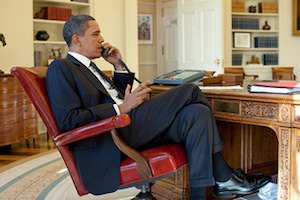The President’s Kill List
Barack Obama campaigned to become the 44th president with vows to close Guantanamo, stop torture and end the war in Iraq. But campaigning and governing are two entirely separate things, as Obama quickly found out when confronted with the sustained threat of terrorism against the U.S. and the realities of fighting two foreign wars.
Barack Obama campaigned to become the 44th president with vows to close Guantanamo, stop torture and end the war in Iraq. But campaigning and governing are two entirely separate things, as Obama quickly found out when confronted with the sustained threat of terrorism against the U.S. and the realities of fighting two foreign wars.
Reiterated promises of “hope” and “change” on the campaign trail had little to do with things such as decisions related to “kill lists” and “signature strikes” that Obama encountered when he entered the Oval Office. The result: a policy that is perhaps more aggressive than the one his predecessor George W. Bush utilized in attempting to root out terrorism, and one that may surprise — or even shock — the liberal voters who cast their ballots for Obama in 2008. –TEB
Newsweek via The Daily Beast:
Sometimes called “crowd killing,” signature strikes are deeply unpopular in Pakistan. Obama struggled to understand the concept. Steve Kappes, the CIA’s deputy director, offered a blunt explanation. “Mr. President, we can see that there are a lot of military-age males down there, men associated with terrorist activity, but we don’t always know who they are.” Obama reacted sharply. “That’s not good enough for me,” he said. But he was still listening. Hayden forcefully defended the signature approach. You could take out a lot more bad guys when you targeted groups instead of individuals, he said. And there was another benefit: the more afraid militants were to congregate, the harder it would be for them to plot, plan, or train for attacks against America and its interests.
Obama remained unsettled. “The president’s view was ‘OK, but what assurances do I have that there aren’t women and children there?’?” according to a source familiar with his thinking. “?‘How do I know that this is working? Who makes these decisions? Where do they make them, and where’s my opportunity to intervene?’?”
In the end, Obama relented—for the time being. The White House did tighten up some procedures: the CIA director would no longer be allowed to delegate the decision to carry out a drone strike down the chain. Only the director would have that authority, or his deputy if he was not available. And the White House reserved the right to pull back the CIA’s signature authority in the future. According to one of his advisers, Obama remained uneasy. “He would squirm,” recalled the source. “He didn’t like the idea of ‘kill ’em and sort it out later.’?”
Still, Obama’s willingness to back the drone program represented an early inflection point in his war on terror. Over time, the attacks grew—far beyond anything that had been envisioned by the Bush administration. When Obama accepted the Nobel Peace Prize in December 2009, he had authorized more drone strikes than George W. Bush had approved during his entire presidency. By his third year in office, Obama had approved the killings of twice as many suspected terrorists as had ever been imprisoned in Guantánamo Bay. “We’re killing these sons of bitches faster than they can grow them,” the head of the CIA’s counterterrorism division boasted to The Washington Post in 2011.
Your support matters…The New York Times:
Mr. Obama is the liberal law professor who campaigned against the Iraq war and torture, and then insisted on approving every new name on an expanding “kill list,” poring over terrorist suspects’ biographies on what one official calls the macabre “baseball cards” of an unconventional war. When a rare opportunity for a drone strike at a top terrorist arises — but his family is with him — it is the president who has reserved to himself the final moral calculation.
“He is determined that he will make these decisions about how far and wide these operations will go,” said Thomas E. Donilon, his national security adviser. “His view is that he’s responsible for the position of the United States in the world.” He added, “He’s determined to keep the tether pretty short.”
Nothing else in Mr. Obama’s first term has baffled liberal supporters and confounded conservative critics alike as his aggressive counterterrorism record. His actions have often remained inscrutable, obscured by awkward secrecy rules, polarized political commentary and the president’s own deep reserve.
Independent journalism is under threat and overshadowed by heavily funded mainstream media.
You can help level the playing field. Become a member.
Your tax-deductible contribution keeps us digging beneath the headlines to give you thought-provoking, investigative reporting and analysis that unearths what's really happening- without compromise.
Give today to support our courageous, independent journalists.






You need to be a supporter to comment.
There are currently no responses to this article.
Be the first to respond.